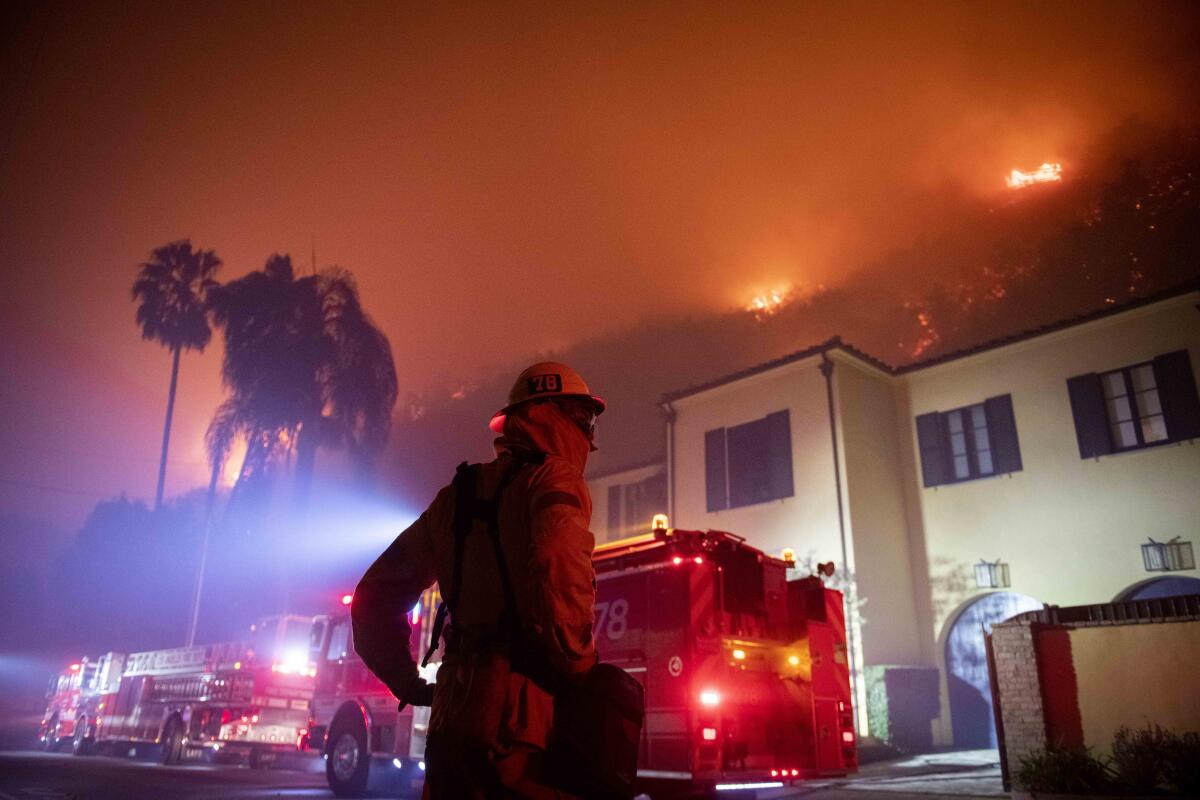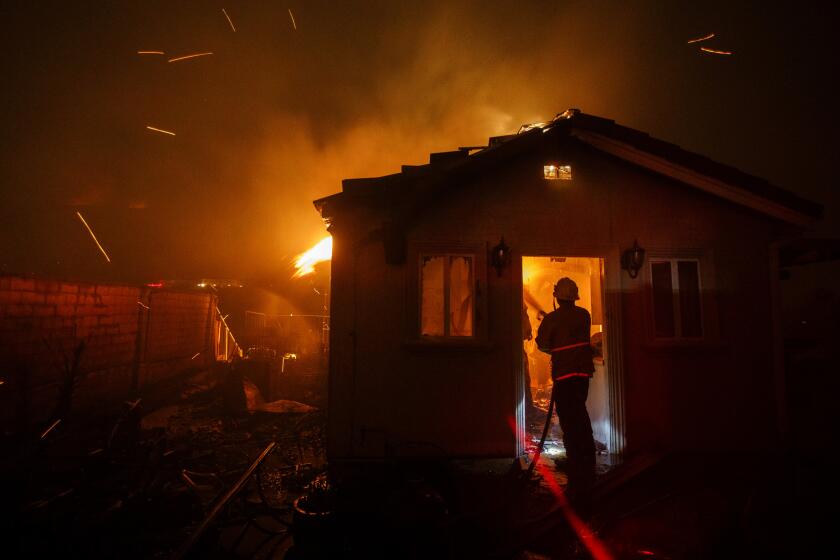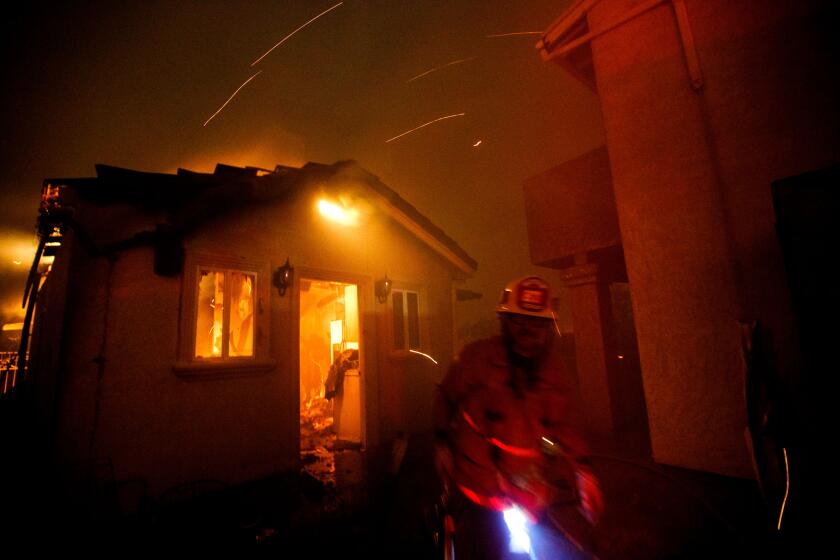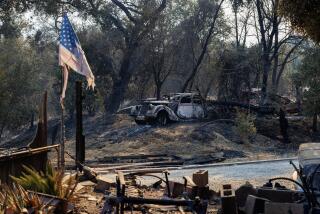Upscale Westside L.A. neighborhoods hit very hard by State Farm home insurance cancellations

Thousands of Californians who won’t see their home insurance renewed by State Farm this summer are homeowners in Los Angeles County, with some upscale Westside neighborhoods hit hard, according to the insurer’s recent filings with the Department of Insurance.
A majority of the insurer’s customers in neighborhoods in West Los Angeles as well as in or near the Santa Monica Mountains including Bel-Air, Pacific Palisades and Woodland Hills are going to lose their coverage.
The State Farm move affects some of the county’s toniest neighborhoods — adding another layer of expense and financial risk for homeowners in areas that were already costly and imperiled by wildfires. Older homeowners and those with comparatively lower incomes who bought when housing was much cheaper could be hard hit.
Last month, State Farm — the largest home insurance provider in California — said it would drop 72,000 property policies across the state amid a home insurance crisis. Of those, about 30,000 are home insurance policies.
State Farm announced this week it will not renew 72,000 policies in California amid a tight insurance market.
Denise Hardin, president and chief executive of State Farm, explained the company’s decision in a March 20 letter to Insurance Commissioner Ricardo Lara, stating that rate hikes that were recently approved by the Department of Insurance amid high inflation would be insufficient to restore the company’s financial strength.
“We must now take action to reduce our overall exposure to be more commensurate with the capital on hand to cover such exposure, as most insurers in California have already done,” she wrote. “We have been reluctant to take this step, recognizing how difficult it will be for impacted policyholders, in addition to our independent contractor agents who are small business owners and employers in their local California communities.”
“A financial failure of [State Farm] will detrimentally impact the entire market,” Hardin added, “an outcome we are all trying to avoid.”
The letter also included several pages of ZIP Codes and the number of homeowners who would lose their coverage this summer.
Where State Farm is cutting coverage, by ZIP codes.
In Pacific Palisades, according to the letter, 69.4% of the 2,342 policyholders — or about 1,600 — will lose coverage. In Brentwood, 61.5% of State Farm’s 2,114 customers there will lose their policies, or about 1,300 non-renewals.
Of the 1,805 policyholders in Woodland Hills, 60% — or about 1,090 — won’t be renewed, while in Bel-Air, 67% of 987 customers, about 660 customers, will be affected,
Orinda in Contra Costa County and Los Gatos in Santa Clara County also will see a high number of policyholders lose coverage.
As part of its assessment, the insurer looked at communities in areas prone to wildfires as well as those at risk of fires following an earthquake, which included communities such as Beverly Hills and Westwood.
Thelma Waxman, president of the Brentwood Homeowners Assn., whose 1,200 members own about 4,000 properties, said it had been a stressful time for members, and for residents living near high-risk fire zones.
Losing State Farm coverage “is the No. 1 topic of discussion” among association members, she said. “Everybody is nervous.”
Last year, the association created its first California Fire Safety Council and worked closely with My Safe L.A., a nonprofit providing fire and safety education, as well as the Los Angeles Fire Department in an attempt to reduce fire risks in the area.
California’s property insurer experiences enrollment surge, raising questions about its financial stability.
Waxman said the formation of the safety council was partly in response to insurance companies dropping policyholders in the state.
“At first we thought we could get a discount,” she said, “but then it became about trying to keep our policies.”
Waxman said she’d been urging residents who will lose their home insurance with State Farm to start shopping now for a new home insurance policy as it’s difficult to find insurers writing policies in the state.
State Farm said non-renewal letters for homeowner insurance would start to go out on July 3, then commercial properties on Aug. 20.
State Assemblywoman Jacqui Irwin (D-Thousand Oaks), whose district includes many of the affected neighborhoods, expressed concern but hoped that the state could end the crisis by altering regulations to encourage insurers to “return to the business of writing policies for Californians and their properties.”
Insurance companies have cited high inflation, catastrophe exposure, the cost of reinsurance (a type of insurance for insurance companies) and the limitations posed by decades-old insurance regulations as reasons for scaling back policies in the state.
Left with no other choice, a number of Californians have turned to the FAIR Plan as a last resort. Funded by the insurers doing business in California, the Fair Access to Insurance Requirement plan provides more limited coverage as a fallback for property owners unable to find conventional policies they can afford.
But the enrollment surge is putting a financial strain on the state insurer as it faces a potential loss of $311 billion, up from $50 billion in 2018.
State officials said the FAIR Plan had a surplus of $200 million and was at risk of insolvency should a catastrophic event occur.
Lara has proposed a set of new rules that would allow insurers to raise rates to cover reinsurance costs and projected losses from catastrophic fires, but also require that they provide coverage for more homes in California’s canyons and hills.
The proposals, which aim to move people off the FAIR Plan and slow the increase in premiums, have won support from insurance industry trade groups and some consumer groups, although some consumer advocates, such as Consumer Watchdog, have criticized the proposed rules.
In the letter to Lara, Hardin said State Farm would continue to cooperate with the state in finding a resolution to the home insurance crisis.
“We are acutely aware of the political challenges that the actions needed to improve [State Farm’s] financial position pose to broader reform efforts,” she wrote. “Please know that we have an ongoing desire and commitment to collaborate with you and your staff, as well as the Governor’s office, to achieve these reforms as quickly as possible.”
More to Read
Sign up for Essential California
The most important California stories and recommendations in your inbox every morning.
You may occasionally receive promotional content from the Los Angeles Times.












